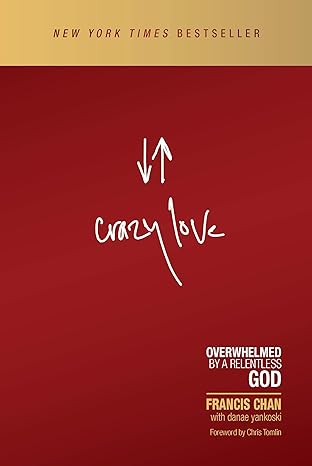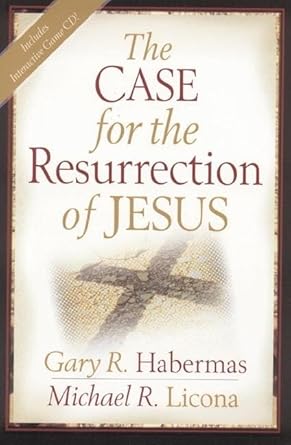
Crazy Love Book Review: Is Your Faith Lukewarm or On Fire?
Monday, April 1, 2013Here's a question that might sting a little: What if the version of Christianity you've been living—the comfortable, safe, "I've got this figured out" kind—is actually missing the point entirely?
Francis Chan's Crazy Love: Overwhelmed by a Relentless God doesn't tiptoe around your feelings. It doesn't ease you gently into deeper faith with soft background music and inspirational quotes. Instead, it grabs you by the collar (lovingly, but firmly) and asks: Are you truly living for God, or are you just checking the boxes? Is your faith marked by the kind of radical obedience that makes people think you're a little crazy, or is it... convenient?
I'll be honest—this book messed me up. In the best way possible. Published back in 2008, Crazy Love became an instant classic, and not because it made anyone feel warm and fuzzy. It became essential reading because it dared to call out the elephant in the church: most of us are living lukewarm lives while claiming to follow a God who gave everything.
So let's dive into why Chan's urgent call to surrender still shakes up believers today, and whether this is the wake-up call your faith needs.
About the Book: When Someone Finally Says What We're All Thinking
Francis Chan Doesn't Just Talk the Talk
You know how some Christian authors write about radical faith from their comfortable offices, then go home to their mega-mansions? Yeah, Francis Chan isn't that guy.
Chan founded Cornerstone Church in Simi Valley, California, and built it into a thriving community. Then—and this is where it gets interesting—he actually started living out the stuff he was preaching. He gave away the majority of his book royalties. He downsized his lifestyle. Eventually, he and his family moved overseas to serve in unreached areas.
That's what makes Crazy Love hit differently. This isn't theory from someone who's never wrestled with these questions. It's conviction from a guy who looked at his own comfortable life and asked, "Is this really what following Jesus looks like?" His authenticity gives every challenge in this book a weight that's hard to dismiss.
The Core Message: God's Love Should Wreck Your Life (In a Good Way)
Here's the beautiful tension at the heart of Crazy Love: God's love for us is absolutely, mind-blowingly extravagant. Like, "numbered the hairs on your head" and "knows when a sparrow falls" kind of love. Yet somehow, our response is often... meh. We love Him back on Sundays, when it's convenient, when it doesn't cost us too much.
Chan builds his entire book around themes that, honestly, most of us would rather avoid:
God's Relentless Love: The book opens by making you feel really, really small. Chan throws statistics at you about the universe—how massive it is, how powerful God must be to speak it into existence. Just when you're feeling like a speck of dust, he reminds you: This infinite, all-powerful God knows your name and loves you personally. It's the kind of truth that should change everything about how you live.
Lukewarm Christianity: Okay, buckle up for this one. Chan's "Profile of the Lukewarm" section is basically a spiritual mirror that most of us don't want to look into. He lists out characteristics of lukewarm believers—people who attend church but avoid real sacrifice, who give God their leftovers instead of their best, who've made following Jesus fit neatly into their comfortable lives. Reading it feels less like a book and more like someone reading your journal back to you.
Sacrificial Living: Ever notice how we can justify basically anything? Chan doesn't let us off the hook. He asks the questions that make you squirm: Why do we spend more on coffee each month than we give to the poor? How can we live in abundance while billions suffer? Why do our calendars reveal that we're far more committed to Netflix than to prayer? Ouch.
Radical Obedience: Jesus said some pretty extreme stuff. Sell your possessions. Love your enemies. Die to yourself. Pick up your cross daily. Chan keeps circling back to these commands and asking a simple question: Why do we treat them like suggestions?
What I appreciate is that each chapter doesn't just dump conviction on you and leave. There are reflection questions that force you to actually examine your life. This isn't passive reading—it's active reckoning with whether your faith is real or just religious performance.
The Good: Why This Book Still Hits Like a Ton of Bricks
Finally, Someone Said It Out Loud
You know what's refreshing? Chan refuses to make Christianity marketable. While bookstore shelves overflow with titles promising your "best life now" and "breakthrough in seven easy steps," Crazy Love promises something way more biblical and infinitely harder: the crucified life.
His writing style feels like that one mentor or youth pastor who loved you enough to tell you the truth instead of just making you feel good. It's passionate without being preachy, direct without being harsh. Reading it feels like someone finally has the courage to say what we've all been thinking but were too polite to mention.
The chapter "When You're in Love" is honestly beautiful. Chan paints a picture of what faith looks like when it's not about obligation or guilt, but about responding to overwhelming grace. He describes believers so head-over-heels for Jesus that sacrifice doesn't even feel like sacrifice anymore. It's like when you're newly married—you don't resent doing things for your spouse because you're so in love. That's what following Jesus should feel like.
The Parts That Stick With You Long After You Close the Book
Let me tell you about "Profile of the Lukewarm." This section has become legendary in Christian circles, and for good reason. Chan doesn't attack people—he just holds up an incredibly accurate mirror.
Lines like "lukewarm people give money to charity and to the church... as long as it doesn't impinge on their standard of living" or "lukewarm people don't really want to be saved from their sin; they want only to be saved from the penalty of their sin" cut through all our self-deception like a hot knife through butter.
I remember reading that section in a coffee shop and having to close the book because it hit too close to home. That's the mark of prophetic writing—it makes you uncomfortable in ways that lead to real change.
Chan also uses statistics that stop you in your tracks. He'll juxtapose how much the average American spends on entertainment against the reality of global poverty. Or he'll compare our prayers for good parking spots with the desperate prayers of persecuted believers. These aren't manipulation tactics—they're reality checks that expose how small and self-centered our spiritual vision has become.
Real People, Real Change
Here's what sets Crazy Love apart from books that just make you feel inspired: Chan shares actual stories of ordinary people who took Jesus seriously and changed their lives.
These aren't superstar missionaries with special callings. They're regular believers who downsized their homes, adopted kids out of the foster system, moved to dangerous neighborhoods, and gave away money they could have kept. What makes these stories powerful is that they make radical faith feel... possible? Like, "If that soccer mom from the suburbs can do it, maybe I can too?"
The reflection questions at the end of each chapter don't let you off the hook either:
- What percentage of your income actually reflects sacrificial giving?
- How much time do you spend pursuing comfort versus pursuing God?
- If a non-believer looked at your life, would they see anything different?
These aren't the kind of questions you can answer and move on. They linger. They follow you to work, to the grocery store, to that next online shopping cart.
It Changes More Than Just You
I've seen Crazy Love used in small groups, and let me tell you—it gets real, fast. When you read this book with other believers, suddenly everyone's talking honestly about their bank accounts, their time, their secret compromises. It surfaces the tension we usually keep buried under polite church conversation.
Churches have used it for entire campaigns, and the ripple effects are significant. People actually change how they live. I've heard story after story of believers who read this book and then radically altered their spending, simplified their lifestyles, started serving in ways they'd always avoided, or even moved across the world for missions. That's not hype—that's transformation.
The Not-So-Good: Let's Be Honest About the Challenges
It Can Feel Like Drinking From a Fire Hose
Look, I love this book. But I also need to be real with you: Crazy Love's intensity can be overwhelming. If you're already someone who struggles with guilt, perfectionism, or spiritual burnout, Chan's relentless challenges might feel crushing instead of freeing.
The book comes at you hard and fast, and it can create this sense that nothing you're doing is enough. You're not praying enough, giving enough, sacrificing enough, loving enough. That's a real danger, because it can push you toward performance-driven religion instead of grace-fueled transformation. And that's the exact opposite of what the gospel is about.
Some critics point out—and I think fairly—that Chan sometimes conflates American middle-class comfort with spiritual compromise. Yes, we need to wrestle with materialism. Absolutely. But not every believer is called to the exact same expression of "radical faith." A single mom working two jobs to keep her kids fed might be living more sacrificially than someone who dramatically downsizes from an already comfortable position. Context matters.
The danger is that readers can finish the book feeling condemned for choices that might actually be faithful within their unique situation and calling.
More Diagnosis Than Prescription
While Crazy Love brilliantly identifies the problem, it offers less guidance on how to change. Chan gives you inspiring examples and challenging questions, but not a lot of systematic steps for transformation. Readers hungry for the "how" of discipleship might finish feeling stirred but directionless. Like, "Great, I'm convicted. Now what?"
This isn't necessarily a fatal flaw—sometimes conviction is enough to get us moving. But it does mean Crazy Love works best when you pair it with other discipleship resources that can help you build sustainable rhythms of radical obedience.
Potentially Discouraging for New Believers
If you're brand new to faith, still figuring out the basics of prayer and Scripture reading, this book might overwhelm you. Chan seems to be writing primarily to longtime Christians who've settled into comfortable complacency, not to people who are just learning what following Jesus means.
A new believer might read Crazy Love and come away thinking faith is primarily about what they have to do and sacrifice, potentially missing the beautiful truth of what Christ has already done for them. While Chan absolutely believes in grace—that's clear—his laser focus on response could unintentionally obscure the gospel's core message: you're loved not because of what you do, but because of who God is.
Who Is This Book For?
Crazy Love resonates most powerfully with:
- Christians feeling spiritually stagnant who sense there must be more to faith than their current experience
- Believers seeking deeper commitment ready to move beyond surface-level religion to wholehearted devotion
- Readers drawn to bold, convicting messages who appreciate directness over diplomacy
- Fans of Francis Chan's teaching wanting to explore his core convictions in depth
- Small groups or churches looking for catalyst conversations about authentic discipleship
- Young adults and college students navigating what lifelong faithfulness will look like
- Anyone wrestling with materialism in American culture and its conflict with kingdom values
This book is not ideal for:
- Brand-new Christians still learning gospel basics
- Readers currently experiencing spiritual burnout or legalistic baggage
- Those seeking gentle encouragement rather than prophetic challenge
- People wanting step-by-step discipleship instruction
Final Verdict: The Wake-Up Call You Didn't Know You Needed
Here's my take: Crazy Love is essential reading for anyone willing to ask hard questions about their faith. Francis Chan's passionate call to recognize God's overwhelming love and respond with your whole life cuts through comfortable, cultural Christianity like nothing else I've read.
Is it a comfortable book? Absolutely not. Is it perfect? No—the intensity won't work for everyone, and it diagnoses problems better than it prescribes solutions. But here's the thing: for those of us who've gotten too comfortable, who suspect our faith has become too safe and too small, who know deep down that we've shaped our Christianity around our culture instead of around Christ... this book is the jolt we desperately need.
The proof is in the results. I can't tell you how many people I know whose lives fundamentally changed after reading Crazy Love. Different spending patterns. Different use of time. Different decision-making processes. Different understanding of what it actually means to follow Jesus. That kind of widespread transformation doesn't happen with books that just make you feel good for an afternoon.
In a Christian publishing world saturated with self-help spirituality and feel-good messages, Chan's prophetic voice calling us back to biblical radicalism remains as urgently relevant today as when he wrote it.
So here's my honest recommendation: If you're content with comfortable Christianity, if you like your faith predictable and manageable, skip this book. It'll just annoy you.
But if you're ready—truly ready—to be challenged, convicted, and potentially changed by a fresh encounter with God's relentless love and what it demands of your life? Crazy Love might be exactly what your soul has been craving.
More Books
Comments



